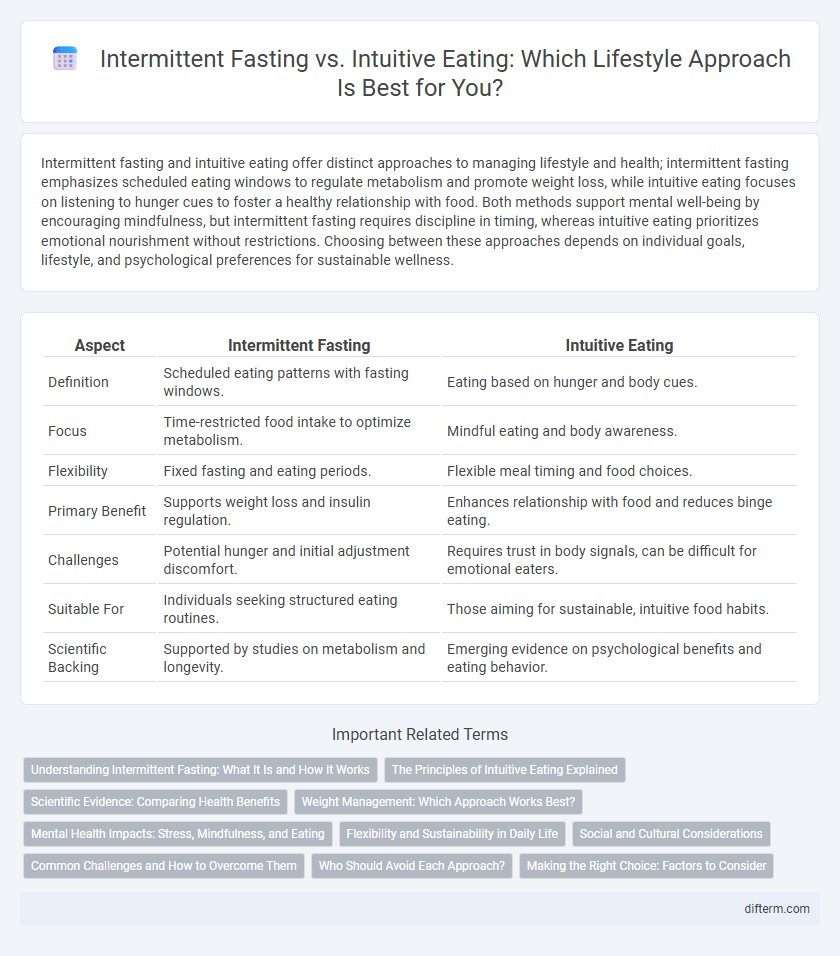Intermittent fasting and intuitive eating offer distinct approaches to managing lifestyle and health; intermittent fasting emphasizes scheduled eating windows to regulate metabolism and promote weight loss, while intuitive eating focuses on listening to hunger cues to foster a healthy relationship with food. Both methods support mental well-being by encouraging mindfulness, but intermittent fasting requires discipline in timing, whereas intuitive eating prioritizes emotional nourishment without restrictions. Choosing between these approaches depends on individual goals, lifestyle, and psychological preferences for sustainable wellness.
Table of Comparison
| Aspect | Intermittent Fasting | Intuitive Eating |
|---|---|---|
| Definition | Scheduled eating patterns with fasting windows. | Eating based on hunger and body cues. |
| Focus | Time-restricted food intake to optimize metabolism. | Mindful eating and body awareness. |
| Flexibility | Fixed fasting and eating periods. | Flexible meal timing and food choices. |
| Primary Benefit | Supports weight loss and insulin regulation. | Enhances relationship with food and reduces binge eating. |
| Challenges | Potential hunger and initial adjustment discomfort. | Requires trust in body signals, can be difficult for emotional eaters. |
| Suitable For | Individuals seeking structured eating routines. | Those aiming for sustainable, intuitive food habits. |
| Scientific Backing | Supported by studies on metabolism and longevity. | Emerging evidence on psychological benefits and eating behavior. |
Understanding Intermittent Fasting: What It Is and How It Works
Intermittent fasting involves cycling between periods of eating and fasting, typically ranging from 16 to 24 hours, which promotes fat burning and metabolic health improvements. This approach regulates insulin levels and encourages cellular repair processes such as autophagy, enhancing overall energy efficiency. Unlike traditional dieting, intermittent fasting focuses on when to eat rather than what to eat, making it a flexible and practical lifestyle strategy for weight management and longevity.
The Principles of Intuitive Eating Explained
Intuitive eating centers on honoring hunger and fullness cues to foster a healthy relationship with food, contrasting structured regimens like intermittent fasting. It encourages eating based on internal signals rather than external rules, promoting body awareness and self-compassion. This approach prioritizes mental well-being and sustainable eating habits over restrictive diets, supporting long-term lifestyle balance.
Scientific Evidence: Comparing Health Benefits
Intermittent fasting has demonstrated through numerous clinical studies its efficacy in promoting weight loss, improving insulin sensitivity, and reducing markers of inflammation, which are critical for metabolic health. Intuitive eating, supported by psychological research, improves mental well-being and reduces disordered eating behaviors by encouraging body awareness and self-regulation without calorie counting. Meta-analyses reveal that intermittent fasting yields more significant short-term metabolic improvements, while intuitive eating fosters sustainable lifestyle changes and positive emotional outcomes over the long term.
Weight Management: Which Approach Works Best?
Intermittent fasting promotes weight management by regulating insulin levels and enhancing fat metabolism through timed eating windows. Intuitive eating fosters sustainable weight control by encouraging body awareness and eliminating restrictive dieting, reducing binge eating risks. Research indicates intermittent fasting may yield quicker weight loss results, while intuitive eating supports long-term psychological well-being and balanced eating habits.
Mental Health Impacts: Stress, Mindfulness, and Eating
Intermittent fasting promotes structured eating windows, which can reduce decision fatigue but might increase stress for individuals sensitive to food restrictions. Intuitive eating emphasizes mindfulness and listening to hunger cues, fostering a healthier relationship with food and lowering anxiety around eating behaviors. Studies indicate that intuitive eating correlates with improved mental health outcomes, including decreased stress and enhanced emotional well-being.
Flexibility and Sustainability in Daily Life
Intermittent fasting offers structured eating windows that can enhance discipline but may challenge flexibility during social events or irregular schedules. Intuitive eating promotes listening to internal hunger cues, allowing adaptable meal timing that better supports long-term sustainability and mental well-being. Balancing these approaches depends on individual lifestyle demands, with intuitive eating generally providing greater ease in maintaining consistent healthy habits.
Social and Cultural Considerations
Intermittent fasting often requires strict timing and meal patterns that may conflict with social gatherings and cultural traditions centered around shared meals and celebrations. Intuitive eating emphasizes listening to hunger cues and flexibility, supporting social interactions without dietary restrictions, making it more adaptable to diverse cultural practices. Both approaches impact social dynamics differently, influencing how individuals navigate cultural food norms and communal eating experiences.
Common Challenges and How to Overcome Them
Intermittent fasting often poses challenges such as managing hunger pangs and adapting to strict eating windows, which can be overcome by gradually increasing fasting periods and staying hydrated to reduce cravings. Intuitive eating may struggle with distinguishing true hunger cues from emotional eating, addressed by mindfulness practices and keeping a food journal to track patterns. Both approaches benefit from consistent self-awareness and flexibility to foster a sustainable, healthy relationship with food.
Who Should Avoid Each Approach?
Intermittent fasting should be avoided by individuals with a history of eating disorders, pregnant or breastfeeding women, and those with certain medical conditions such as diabetes without medical supervision. Intuitive eating is not recommended for people who struggle with severe emotional eating, require structured dietary plans for medical reasons, or need precise nutrient tracking for specific health goals. Consulting healthcare professionals is essential before starting either approach to ensure safety and effectiveness tailored to individual health profiles.
Making the Right Choice: Factors to Consider
Choosing between intermittent fasting and intuitive eating depends on individual health goals, lifestyle, and personal relationship with food. Intermittent fasting offers structured eating windows that can promote weight loss and metabolic health, while intuitive eating emphasizes listening to hunger cues and fostering a positive body image. Factors such as medical conditions, stress levels, and consistency should guide the decision for a sustainable and effective nutritional approach.
Intermittent Fasting vs Intuitive Eating Infographic

 difterm.com
difterm.com